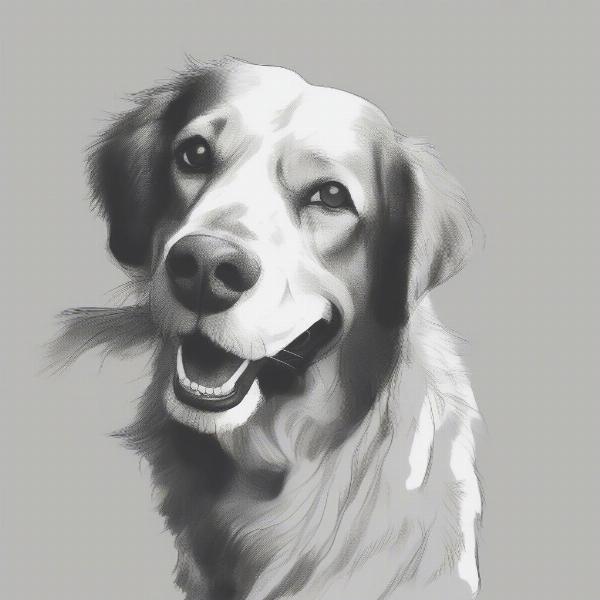The term “dookie dog” is often used colloquially, but what does it truly signify? While it may evoke some humorous imagery, it’s essential to understand the potential concerns behind this seemingly lighthearted phrase. This article delves into the meaning of “dookie dog,” exploring its connection to canine health and hygiene, and offering practical advice for dog owners.
What Does “Dookie Dog” Imply?
“Dookie dog” generally refers to a dog that frequently defecates, sometimes excessively or in inappropriate places. While the term itself isn’t a formal diagnosis, it points to potential underlying issues that require attention. These can range from dietary problems to behavioral concerns or even medical conditions. Understanding the root cause is crucial for effectively addressing the “dookie dog” situation.
Dietary Considerations for the “Dookie Dog”
A dog’s diet plays a significant role in their digestive health and bowel movements. Low-quality food, food allergies, or sudden dietary changes can lead to increased frequency of defecation. Choosing a high-quality, balanced diet appropriate for your dog’s age, breed, and activity level is essential. Consult your veterinarian to determine the best dietary approach for your furry friend.
Behavioral Aspects of the “Dookie Dog”
Sometimes, frequent defecation can be a manifestation of underlying behavioral issues such as anxiety, stress, or even excitement. Changes in routine, new environments, or separation anxiety can trigger this behavior. Identifying these stressors and implementing appropriate behavioral modification techniques can help manage the issue.
 Dog Showing Signs of Stress and Anxiety
Dog Showing Signs of Stress and Anxiety
Medical Conditions and the “Dookie Dog”
In some cases, frequent defecation can be a symptom of an underlying medical condition. Inflammatory bowel disease, parasites, infections, or even certain types of cancer can affect a dog’s digestive system and lead to increased bowel movements. If your dog’s defecation habits suddenly change or are accompanied by other symptoms like vomiting, lethargy, or loss of appetite, it’s crucial to consult a veterinarian immediately.
Managing the “Dookie Dog” Situation
Addressing the “dookie dog” situation requires a multi-faceted approach. This includes:
- Dietary adjustments: Transitioning to a high-quality diet or addressing potential food allergies.
- Behavioral modification: Managing stress and anxiety through training, enrichment, and creating a stable environment.
- Veterinary care: Seeking professional medical advice for diagnosis and treatment of underlying medical conditions.
- Consistent potty training: Reinforcing proper elimination habits through positive reinforcement.
Conclusion
While “dookie dog” may be a casual term, it highlights the importance of paying attention to your dog’s bowel movements. By understanding the potential causes and implementing appropriate solutions, you can ensure your furry companion’s health and well-being. Remember, a healthy dog is a happy dog!
FAQ
- Does the term “dookie dog” always indicate a serious problem? Not necessarily. It can sometimes simply be a result of dietary changes or temporary stress. However, it’s crucial to monitor the situation and consult a vet if the issue persists.
- What are some signs that my “dookie dog” needs veterinary attention? Vomiting, lethargy, blood in the stool, loss of appetite, and significant changes in bowel consistency are all signs that warrant a veterinary visit.
- Can training help with a “dookie dog”? Yes, particularly if the issue stems from anxiety or stress. Positive reinforcement and creating a predictable routine can be beneficial.
- How can I choose the right diet for my “dookie dog”? Consult your veterinarian. They can recommend a diet based on your dog’s specific needs and health conditions.
- What if my “dookie dog” continues to have issues despite dietary and behavioral changes? Further veterinary investigation is necessary to rule out underlying medical conditions.
- Is it normal for a puppy to be a “dookie dog”? Puppies often have more frequent bowel movements due to their developing digestive systems. However, excessive or uncontrolled defecation should still be addressed.
- Are certain dog breeds more prone to being “dookie dogs”? Not necessarily, though some breeds with sensitive stomachs may be more susceptible to digestive issues.
ILM Dog is a leading international dog care website dedicated to providing expert advice and resources for dog owners worldwide. We offer comprehensive information on dog breeds, health, training, nutrition, grooming, and much more. Whether you’re a seasoned dog owner or just starting out, ILM Dog is your go-to source for reliable and practical dog care information. Contact us at [email protected] or +44 20-3965-8624. Visit ILM Dog for more expert guidance and resources to help you provide the best possible care for your canine companion.